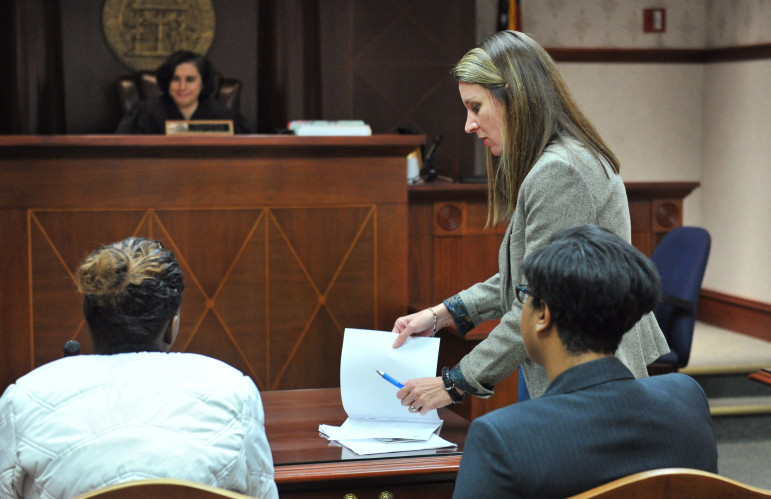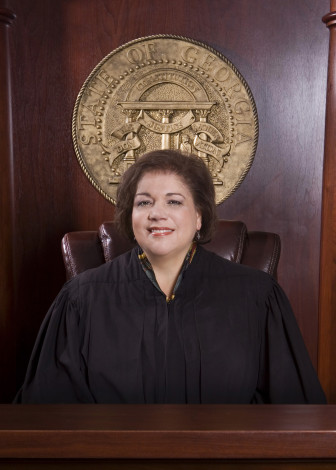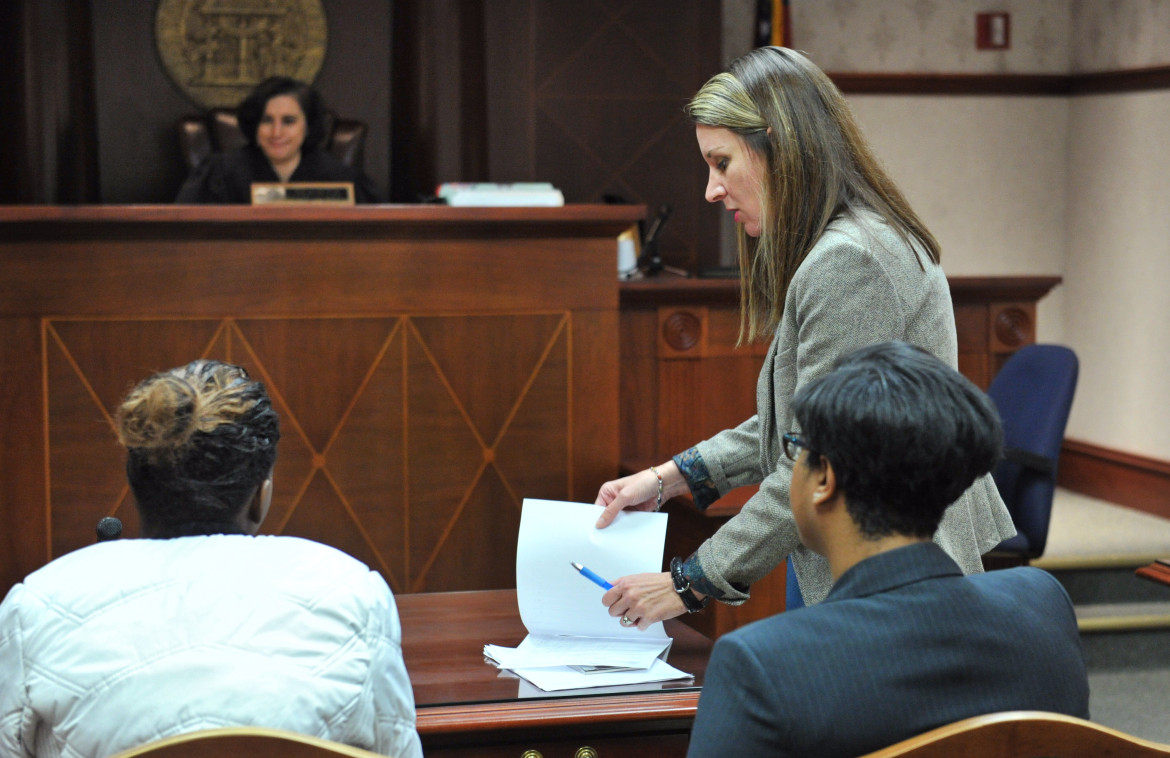
Hyosub Shin / HShin@AJC.com
Newton County Juvenile Court is one of a handful in the nation experimenting with alternative sentencing options for juveniles who are also in foster care. Such children typically have many more adjustment issues and have been dealt with more harshly in the past.
COVINGTON, Ga. — On a bright, fall day — the kind of day that kids love to be outdoors in, riding a bike, playing ball — a 15-year-old walked into a juvenile courtroom in Newton County for a hearing, wearing a dark blue jumpsuit, handcuffs and a look of fear on his face.
He had been picked up for riding a bicycle under the influence in next-doorRockdale County a day or two before and placed in detention.
Had Judge Lisa Mantz not known about the teen’s home difficulties, she might have sent him back to his foster mother’s home.
He’s faced some very hard obstacles. His father is in prison. His mother is absent for unknown reasons, and he hasn’t seen her in years.
|
Dual-status: Main feature, Tribal Nation
|
Because Mantz and the Newton County juvenile justice team make it a matter of protocol to find out whether a youth has been in protective custody or has an open case with the Department of Family and Children’s Services (DFACS), Mantz knew in this case not to send the boy home.
“The foster mom has a meth problem,” Mantz explained after a wrenching hearing. “He wouldn’t be safe going back into that environment.”
 Newton County is one of four sites in the nation chosen by the Robert F. Kennedy Children’s Action Corps to serve as a demonstration project — to show how the juvenile justice court can work with DFCS, other children-serving agencies and the community to identify dual status youth and get them the help they need.
Newton County is one of four sites in the nation chosen by the Robert F. Kennedy Children’s Action Corps to serve as a demonstration project — to show how the juvenile justice court can work with DFCS, other children-serving agencies and the community to identify dual status youth and get them the help they need.
While this young person’s case resulted in his being kept in detention, the collaborative efforts of the Newton County Juvenile Court and DFACS play out in different ways in different cases. The goal is to keep dual status youth out of detention and to instead get them and their families the help they need to stay out of detention.
Using an initiative that recognizes that most juvenile offenders are dually involved in the child welfare system, Newton County is changing its strategy for working with youth in the juvenile justice system.
Previously, the county might have looked at a youth’s juvenile record without ever examining his or her involvement in the child welfare system. Now the county’s first step is to learn whether a young person has an open file with the Department of Family and Children Services. A separate intake form is created, and, within three days, DFCS returns information to the court that shows whether a youth is dually involved.
Newton County began tracking the young people charged with offenses in June 2013 to learn how many were dually involved. So far, more than half — 54 percent — of youth fitting the juvenile justice criteria have been identified as dually involved, according to records from Newton County’s research analyst.

Hyosub Shin / HShin@AJC.com
Judge Sheri Roberts
“These youth-serving systems must be working together,” said the Action Corps’ John Tuell, who co-wrote a technical assistance workbook to help juvenile courts work more collaboratively with youth-serving agencies. Tuell credits the leadership of Chief Juvenile Judge Sheri Roberts as well as Mantz and research analyst Diana Summers.
‘“They’re not only identifying these kids, they’re treating these kids,” he said. “This enables them to serve them better, design more targeted programs” and, ultimately, to keep youth out of detention centers when they instead need mental health treatment, family support or both.
“The first response used to be, ‘They need to be locked up,’ ” Mantz said, referring to youth who had been arrested. “Now, it’s how do we de-escalate.”
Often, Mantz and Roberts are able to keep a child in the home rather than out — and to help the parent or parents learn better parenting skills so that they and their child can live together happily.
“It’s about prevention, taking those kids with their first foot in the door, and saying, ‘Family, let’s get some skills. This is manageable. Let’s don’t go any deeper,’ ” Roberts said.
Roberts, a Newton County native, has especially strong ties to the community. For her, this is a dream job. After working in the financial services industry — she has an MBA in addition to her undergraduate and law degrees from the University of Georgia — she practiced law for several years in Kentucky. While she liked her work, she wanted something more fulfilling, something that would help youth in particular. And, she wanted to come home.
She was thrilled to return to Covington, the county seat. Because she has many friends and professional connections in the county, she is able to turn to them for support, and even for financial backing for special projects, such as the Community Help Fund, which is used to help families and children’s groups with one-time financial help.

Hyosub Shin / HShin@AJC.com
Judge Lisa Mantz
Roberts and Mantz are totally committed to the goal of identifying dual status youth and making sure they get the help they need. In part because of Roberts’ numbers background — that MBA came in handy as a juvenile judge — she knew that a research analyst would be key in tracking the cases, their dispositions and how they are referred.
Toward that end, Roberts hired Summers as research analyst for the court. Having hard numbers not only helps Roberts and Mantz as they track cases, but helps get community buy-in.
For example, the court is able to show that more than three-quarters of all dually involved youth were not involved in any pro-social programming. Data also showed that more than one-third of dually involved youth are not attending school. Such information is crucial, the judges say, to help them get help for youth and families — and to educate the community that prevention is far better than detention.
“The ultimate goal is to stop the problem before it gets worse, but first, there has to be a recognition that abuse and neglect are behind most of these offenses,” Roberts said. “Juvenile justice cases escalate so quickly, and they don’t need to. We know that therapeutic intervention can work. We know that ‘scared straight’ does not work. So one of the first goals is to make sure the community understands this, too.”
When Newton first began its pilot project in 2013, Roberts admits there was some resistance.
“People said, ‘Oh, great, there’ll be a crime wave,’ ” she said.
There hasn’t been. Instead, there have been programs throughout the community aimed at reaching at-risk youth before there is any involvement in the juvenile justice system.
For example, because Roberts and Mantz started seeing more girls coming through the system — and Summers’ numbers backed that up — Roberts started a class for girls at risk, giving them an opportunity to connect with other girls, to gain mentoring from women in the community and to come together and talk. Roberts holds a tea at her house, and the girls get dressed up and have a chance to be social in a positive environment.
“At the end of the day, our job is just common sense,” Roberts said. “We just try to use good parenting principles ourselves. We’re both very careful in what we say, we acknowledge success, and we try to support the family however we can.”
And even in the difficult cases where a child must be taken from the home, the goal is still to empower the parent.
“Usually, what’s happened is that the balance of power is out of control,” Roberts said. “And we try to let them know they can still be a good parent. It’s amazing to see sometimes when that parent who’s been struggling just gets a little bit of support and respite.”

“alawyer “, just a few questions for you to think about. Have you volunteered to be a foster parent? Are you available to take in a young person gone astray? Are you aware that there is an extreme shortage of foster parents? Do you realize that children ” in care” are not all “poor”? Do you realize that wealthy “parents” neglect and abuse their children? There is an ultimate goal of keeping the young person safe. If that means a night in detention where no other option exists the goal is achieved. Perhaps you are a lawyer as your name states. If so, please consider getting one of your staff to do easily found research before spouting negative rhetoric trying to attack those who are making great efforts for children!!
Thank you Newton County , Judge Roberts, Judge Mantz and staff for your efforts.
Great. So some poor kid who did a very minor thing – peddling around high – gets shackled, strip searched, and sent to the youth prison and otherwise treated like an animal because he has a bad home life, whereas a rich kid with the right parents probably would have been let off with a warning. A rich kid would have been released to his parents immediately and never have seen the inside of the youth prison system. And you’re bragging about this? You are compounding the prison pipeline for kids who are at no fault for the abuse and neglect that they suffer.
Instead of taking him back to detention – or putting him in detention in the first instance for a minor league piece of nonsense, you might have placed him in a shelter – sans shackles. You might have had a special foster parent system in place to release him immediately without exposing him to your youth prison system. And who in the world is responsible for putting him with a foster parent with a meth problem?
Putting a minor offender in juvenile lockup leads to gang affiliations and other unsavory affiliations, a sense of hopelessness, and the belief that he’s seen the worst that you have to offer for the minor and the inane, so what difference does it make if he does something worse the next time? You’ve already grossly over-punished a young boy for making the same sort of mistake that teenagers have made for generations. But it surely does stink to come from the wrong side of the tracks – it’s always worse for the foster care kids – they get charged with crimes disproportionately for things that would not otherwise be on anyone’s radar scope.
This boy has to know that he has been grossly punished for something that other kids skate by – he now has a well defined sense that juvenile justice is juvenile injustice. Let’s hope that he gets out without physical damage as well since being locked up with sexual assault suspects and thieves can cause more than just emotional distress.
No wonder he looked scared.
Would someone kindly intervene and get him the heck out of that horrible place – NOW?
I have knowledge of the facts of this case. The person on meth was not a foster parent as the article states. The court was able to place the child with a fit and willing relative. He is receiving an education and is receiving help with his substance abuse issues. This court is fully aware of the prison pipeline. The court and attorneys work hard to achieve the best outcomes for these children. Glad to see the national attention given to this court and everything they do.
Do you know anything about the juvenile justice system in Ga? The kid had to have scored out high enough on the detention assessment instrument to have been placed in detention in the first place. Should they have sent him back to the meth head foster parent? The state had a massive reform bill that went into effect last year and the numbers of youth in detention have decreased drastically. The number of juveniles in caseloads have decreased. There is a big change going on in this state and it is for the better.
Pingback: Litigation for Foster Children | NACC Child Law Blog